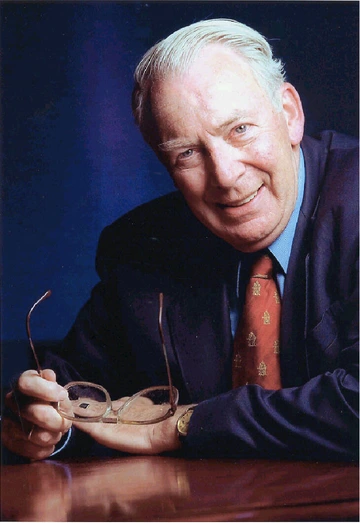
Heiko A. Oberman
The late Heiko Augustinus Oberman was an acclaimed scholar, an educator with few equals, and a man of vision, dedication, and conviction. His trail-blazing work in the later Middle Ages and Reformation made him, a German colleague wrote, "not only the eminent historian of all Protestant denominations, but also of Catholicism" (Hans-Jürgen Goertz, Professor, University of Hamburg, in Mennonitische Geschichtsblätter , 58, 2001). Chance brought him to the University of Arizona and resulted in the creation of a famed center for Late Medieval and Reformation Studies. The standing of this center at the time of Oberman's untimely death and his conditional testament of his peerless research library to the University of Arizona demanded the establishment of a chair linking his name and reputation to our fine public teaching and research university in perpetuity. At the time of his passing it was Oberman's fervent wish that the outstanding center that he had created should continue, not as a monument to him, but to edify and inspire future generations of students in this field. This was accomplished in 2010 and the Oberman Collection transferred to the University of Arizona Libraries.
After earning his doctorate cum laude in historical theology in 1957 from the University of Utrecht, Oberman accepted a call to the Harvard Divinity School. There he soared effortlessly through the ranks to a professorship of Church History in 1963 and to a named chair, the Winn Professorship of Ecclesiastical History, a year later. In 1966 he accepted a chair in Church History in the Protestant Theological Faculty at the University of Tübingen, Germany, and assumed the directorship of the Institute for Late Middle Ages and Reformation. At the pinnacle of his career, his wife's crippling arthritis persuaded him to search for a warmer, drier climate. It was this consideration that prompted him to accept a professorship in History at The University of Arizona in 1984, where he remained until his death. It was here, in the unlikely setting of what he termed "the sun belt," that he founded the Division for Late Medieval and Reformation Studies. He brought his fame with him and made the desert bloom.
Heiko Oberman was the winner of the prestigious Dr. A. H. Heineken Prize for History —the highest award for the historical discipline. Fellow of the Medieval Academy of America, Corresponding Fellow of the British Academy and Correspondent of the Royal Netherlands Academy of Arts and Sciences, in 1991 he was elected as a member of the American Philosophical Society. He received many distinguished fellowships and awards including honorary degrees from Harvard University, the University of St. Louis, the University of Aberdeen (Scotland), and Valparaiso University (Indiana). Author and/or editor of 30 books and some hundred articles, he is particularly known for his prize-winning study The Harvest of Medieval Theology (Harvard University Press, 1963) and for his Luther: Man Between God and the Devil (English version, Yale University Press, 1990), for which he received the German Historischer Sachbuchpreis for "the most significant history book during the decade 1975-1985." Coincident with the diagnosis of his terminal illness, it was announced that a distinction for extraordinary representation of Dutch scholarship and culture would be conferred on Heiko Oberman by Queen Beatrix of the Netherlands in April 2002.
Perhaps more than at Harvard or at Tübingen, it was at a public university that Oberman had the opportunity to implement and exercise his social mission of education. Born and raised in a country the size of the Netherlands, he communicated to his students from the seemingly boundless America that: "One cannot be parochial in a country so small that speeding sends you into another country, with its own language, customs, and 'certainties' about how things are. You learn early that there are ways other than yours of seeing, other ways of doing everything...." As a teacher, he saw it as his mission to be "a counterweight to media," helping students to distinguish between news and editorial, information and manipulation. He spared no effort to make them "world citizens ... to show them how to travel, how to encounter life experiences." These were the ideals that he was determined to inculcate in his graduate students, those who were to become his colleagues and the teachers of future generations.

